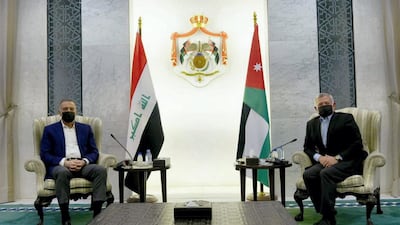Iraqi Prime Minister Mustafa Al Kadhimi discussed how to overcome hard economic conditions with Jordan’s King Abdullah on a brief visit to Amman on Saturday.
The unannounced visit by Mr Al Kadhimi came a day after an official visit to Turkey, during which he praised Ankara as a "real partner" for Baghdad and said he expected "strong" Turkish investments in Iraq.
"The current economic challenges and ways to recover from the effects of the coronavirus pandemic” were a focus of discussions on Mr Kadhimi’s “quick visit” to Amman, the Iraqi state news agency said.
Jordan, Egypt and Saudi Arabia responded to suggestions by Mr Al Kadhimi when he became prime minister in May that Iraq should give priority in its foreign policy to its Arab neighbours rather than Iran.
The three countries reactivated a series of economic agreements with Iraq and upped senior-level discussions with Baghdad this year. Earlier this month Saudi Arabia reopened its main border crossing with Iraq after three decades of closure.
Mr Al Kadhimi is a former intelligence chief supported by Washington. His government planned as soon as it was formed to import electricity from Jordan to help solve significant shortages in Iraq and lessen reliance on Iran.
But it took until September for Iraq and Jordan to sign an agreement to connect the power grid of the two countries.
Iraq exports around 10,000 barrels per day of oil to Jordan, comprising less than 10 per cent of Jordan’s consumption. But the flows have been intermittent this year due to the drop in oil prices and coronavirus restrictions.
Iraqi oil ministry data showed that Iraqi exported last month 252,763 barrels of oil to Jordan, generating $6.7 million in revenue.
Liquidity shortfalls in Iraq contributed this month to a 20 per cent devaluation in the official exchange rate of the Iraqi dinar to 1,450 dinars to the dollar.
Oil revenue remains relatively low and Mr Al Kadhimi’s government has resorted to massive borrowing – instead of addressing fundamental issues like a huge wage bill for state employees and corruption – to control expenditure.
Jordan’s economy has been stagnating for the last decade and officials say the coronavirus is behind a 3 per cent expected contraction in the gross domestic product this year, compared with 2 per cent growth in 2018.
Amman is part of a de facto alliance with Riyadh and Cairo opposed to what the three countries regard as Turkey's aggressive posture in the region. At the same time, they are supportive of US efforts to contain Iran.
Iraqi politicians are split on how to deal with Turkey.
Although there has been official Iraqi criticism of Turkish operations in northern Iraq in pursuit of Kurdistan Workers Party guerrillas, Mr Al Kadhimi made clear the issue would not hamper closer ties with Ankara.
In remarks that appeared in line with the Turkish position, Mr Al Kadhimi said in Ankara that Iraq would not tolerate “any organisations that threaten Turkey’s national security on our territory”.


